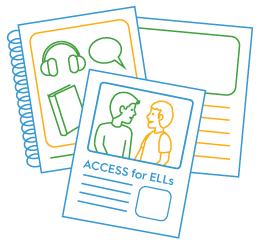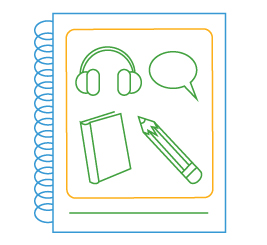Resources/Recursos
Featured Resources



All resources/Todos los recursos
Filter resources by:
Resources/Recursos
The Marco ALE de WIDA: A sociocultural approach to the creation of Spanish language arts standards
This WIDA Snapshot introduces the Marco de referencia de las artes del lenguaje del español de WIDA: Aplicación para la actualización y desarrollo de estándares (Marco ALE). The Marco ALE is a Spanish language arts framework and is designed to support the development of Spanish language arts standards specifically for educational settings in the United States.
Resource DetailsReleased May 2025
Curriculum Amplification Guide and Template
The Curriculum Amplification Guide and Template supports educators as they work to align their academic curricula to the WIDA English Language Development (ELD) Standards Framework, 2020 Edition. It guides educators through three analysis criteria to examine the strength of alignment and guiding questions to support amplifying the alignment across all units of an academic curriculum.
This template is an extension of the WIDA Focus Bulletin Taking a Genre-Based Approach to Curricular Development Using the Curriculum Amplification Guide. To learn more, we encourage you to read the Focus Bulletin.
Resource Details View Download NowReleased May 2025
Taking a Genre-Based Approach to Curricular Development Using the Curriculum Amplification Guide
Implementing the WIDA ELD Standards Framework takes time and looks different across different contexts. While some educators are working with different grade-level content curricula, English language specialists may be working with language curricula focusing on a range of proficiency levels. When instructing multilingual learners, it is especially important that curricula strike a balance between content and language. Although it is tempting to start at the lesson level to begin implementation since it feels more manageable to start small, starting at the curricular level is more effective at building a yearlong, cohesive learning experience that builds on current knowledge and experiences and more intentionally towards new understandings and skills. This Focus Bulletin supports educators to take a genre-based approach to making decisions throughout all units of curricula that can both begin and deepen the alignment of the current academic curricula being used to the WIDA ELD Standards Framework.
Resource Details View Download NowReleased May 2025
Understanding the Proficiency Level Descriptors of Marco DALE
Los descriptores del desempeño lingüístico in Marco DALE provide guidance on how bi/multilingual students can develop language that they can interpret, interact and express in each of the communication modes (interpretative, interactive and expressive).
Resource DetailsReleased February 2025
The Key Language Uses in Bilingual Writing
This WIDA Webinar examines the Key Language Uses in writing in both Spanish and English. A WIDA expert explores an analysis of bilingual writing examples and mentor texts using the lens of the Key Language Uses and los usos clave del lenguaje del Marco DALE.
Resource DetailsReleased January 2025
Marco DALE Digital Explorer
This website serves as a digital database of the Marco de los estándares del desarrollo auténtico del lenguaje español de WIDA (Marco DALE). It categorizes Language Expectations in two ways: by the Marco DALE standard statement and grade-level clusters, and by the Key Language Use and communication mode. Proficiency Level Descriptors (PLDs) can be explored by grade level (K-1 and 2-12) and communication mode.
Resource DetailsReleased September 2024
Administrator Resource for the Implementation of the Marco DALE
The Administrator Resource for the Implementation of the Marco DALE is an all-English publication that provides key information that education administrators need to make decisions on use and implementation of this standards framework. In this resource, you will find the main framework and components of the Marco DALE along with policy and programming implications for bilingual programs. The Marco DALE is WIDA’s latest Spanish language development standards framework, and the full-length publication is presented in Spanish with English summaries at the end of each section.
Resource Details View Download NowReleased July 2024
Administrator Supplement: WIDA ELD Standards Framework Implementation, What, Why, and How?
This webinar offers guidance on using the administrator supplement for the implementation guide for the WIDA English Language Development Standards Framework, 2020 Edition.
Resource DetailsReleased May 2024
Examination of the Current Implementation Status of WIDA English Language Development Standards Framework, 2020 Edition
This report shares findings from the Standards Implementation Study (Sep 2022-Feb 2024). The report explores the current status of the implementation of the WIDA English Language Development Standards Framework, 2020 Edition across layers of the educational system, primarily through the perceptions of teachers, administrators, and policy makers. It identifies key educator and systems-level practices that support or hinder successful implementation; and identifies potentials and needs areas for additional resource development and continued research.
Published: May 2024
Author: Hannah Park
Released May 2024
Keeping the Conversation Going: The Role of Interaction in Language Development
Interaction is of great importance in classrooms, where bi/multilingual students exchange ideas and contribute to a community of learners as they continue to expand their linguistic repertoire. That is why interaction is one of the six Big Ideas of the Marco DALE. In this Focus Bulletin, we explore interaction and its connection to multiliteracies and the Marco DALE modes of communication and Language Expectations.
Published 2024
Authors: Analleli Hernández, Margo Gottlieb
Released March 2024
WIDA ELD Standards Framework Implementation: What, When and How?
This webinar offers guidance on using the implementation guide for the WIDA English Language Development Standards Framework, 2020 Edition.
Resource DetailsReleased January 2024
Desarrollando el español: Authentic Spanish language development with Marco DALE
This webinar showcases the components of Marco de los estándares del desarrollo auténtico del lenguaje español de WIDA (Marco DALE).
Resource DetailsReleased December 2023
ELD Essentials
This flyer shows how WIDA English language development resources fit together. This resource is intended to serve as an entry point for teachers, administrators, state staff, etc. who are new to WIDA’s ELD system of support.
Resource Details View Download NowReleased November 2023
Marco de los estándares del desarrollo auténtico del lenguaje español de WIDA
The Marco de los estándares del desarrollo auténtico del lenguaje español de WIDA (Marco DALE) is a Spanish language development standards framework with Language Functions and sample Language Features designed to guide Spanish language development. Este documento guía el desarrollo del lenguaje español de forma auténtica a ese lenguaje y a contextos bilingües mediante expectativas del lenguaje que contienen funciones del lenguaje y ejemplos de recursos lingüísticos.
Written in Spanish with English summaries
Resource Details View Download NowReleased October 2023
WIDA All Year Long
Learn how WIDA is more than a test! Mr. Vega is a 6th grade EAL (English as an Additional Language) teacher at an international school who works with colleagues and families to support multilingual learners. Follow Mr. Vega all year long, as he focuses on what his students can do, using WIDA resources to collaborate and plan effective learning activities throughout the school year.
Resource Details View Download NowReleased September 2023
Administrator Supplement: WIDA ELD Standards Framework Implementation Guide
The Administrator Supplement is a companion piece to the Implementation Guide. Whereas the Implementation Guide explores ways to apply the ELD Standards Framework into curriculum and instruction at the classroom level, this Administrator Supplement focuses on strategic and programmatic aspects of standards implementation. Its audiences are superintendents, principals, directors, coordinators, coaches and those with similar responsibilities and roles.
Resource Details View Download NowReleased June 2023
Implementation Guide: WIDA ELD Standards Framework
This guide offers practical ways to apply the ELD Standards Framework into curriculum and instruction at the classroom level. Its primary audiences are content and language teachers, specialists, coaches and instructional leaders. This guide is accompanied by the Administrator Supplement that focuses on programmatic aspects of standards implementation.
Resource Details View Download NowReleased June 2023
WIDA Early Language Development Standards
The WIDA Early Language Development Standards, available for English and Spanish language development, are designed for use with children ages 2.5–5.5 years old and correspond to five domains of children’s development and learning: approaches to learning, language and communication development, cognition and general knowledge, physical well-being and motor development, and social and emotional development.
Resource Details View Download NowReleased April 2023
Making Connections (Michigan)
Making Connections: Using the Michigan Early Learning and Development Standards and WIDA Early Years Resources to Plan Instruction for Young Multilingual Children is a comprehensive resource that offers suggestions, tools, and sample plans for teachers who use the Michigan Early Learning and Development Standards and WIDA resources to plan equitable learning opportunities for young multilingual children.
Resource Details View Download NowReleased February 2023
Supporting Multilingual Learners' Language Growth Through Language Development Portfolios
This Focus Bulletin illustrates how teachers and students can use language development portfolios to interpret and document language growth. The bulletin follows the story of how a grade-level team introduced portfolios to their practice, posing several questions the team asked as they refined their usage. It closes by offering two sample tools that teachers can use and adapt to capture multilingual learners’ language growth using modified Proficiency Level Descriptors (PLDs) from the WIDA English Language Development Framework, 2020 Edition.
Published: December 2022
Authors: Fernanda Marinho Kray, Margo Gottlieb, Lynn Shafer Willner
Released December 2022




